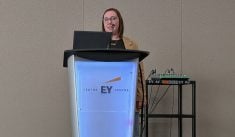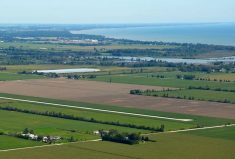Vanguard Crop Nutrition Inc. (VCN) has begun construction on a compound fertilizer manufacturing facility in Maitland, Ont. It will be the first of its kind in Canada.
The facility will produce fertilizers previously imported to Canada and the U.S. from Russia and Eastern Europe, including ELEVEN Superstart, and future launches Soy7 MAX and Pulse8.
Why it matters: Onshoring of compound fertilizer manufacturing could mean more market stability for Canadian farmers.
Read Also

Defence investments could benefit agriculture
A bump in Canada’s NATO spending commitments could lead to infrastructure investments that would benefit rural areas
VCN Canada CEO Ryan Brophy cited “Supply chain disruptions and recent offshore production quality” as catalysts for the project in a June 14 news release.
In an interview, he said that global developments in the past few years have given the project more urgency.
“One of the biggest reasons that we’re moving forward with the onshoring of our manufacturing has been that volatility with the geopolitical instability in Europe,” Brophy said.
The plant is set to open in 2024, but Brophy said that the idea has been years in the making.
“Five years (ago) it was a pipe dream, four years ago, it was something we started really to look at seriously,” Brophy said. “Three years ago, we did a very in-depth feasibility study with BDC. And then, two years ago, we said ‘this is happening and we’re going forward’ and we started to build our team.”
The Canadian fertilizer market, while stabilizing, has been volatile recently.
“When we don’t have full authority over the outgoing quality of the product that we’re selling, we need to make some serious changes,” Brophy said.
“Last year, we noticed the changes and it became more challenging to source materials and it became more challenging for us to vet the quality of the ingredients we were purchasing.”
Brophy explained that European manufacturers have historically had a lock on certain types of fertilizer.
“Compound fertilizer manufacturing has been present in Europe and the EU, and those geographies for several years. Decades, actually,” said Brophy. “It’s a means by which to collate the nutrients in a way that minimizes segregation, it increases the efficiency of the fertilizer being applied. And Europe, for many, many years, has been far ahead of Canada and the U.S. when it comes to nutrient use, efficiency and land utilization.”
“North America is a bulk blending industry,” he said. “They do those in bulk and then they mechanically blend them to come up with a specific analysis that they sell to growers. That’s just been kind of the way it’s been done in Canada and the U.S. for many, many years.”
Brophy said he believes that the onshoring of compound fertilizers, which contain multiple nutrients in each granule, will have both environmental and economic benefits for Canadian farmers.
“We’re adding mineral and biological components to every one of our granules. That really plays a part in carbon capture through the process of enhanced weathering, but also nitrous oxide emission reduction, which is so serious and important when it comes to managing nitrogen fertilizers.”
He said the facility will likely ease the economic burden on Canadian farmers, due in large part to reduced transportation costs.
“We had previously hundreds and hundreds of containers annually from Europe to Canada and then they were loaded to rail and shipped to essentially our warehouse facility in Saskatchewan and distributed to farmers.
“The availability of shipping containers and the price of logistics as a whole has been quite prohibitive over the past while, so onshoring this production will bring us a new level of security so far as being able to provide our products to the grower.”
Fertilizer Canada said via email that it was not able to comment on any direct impacts the facility will have on the future of the Canadian fertilizer market, but did comment on industry innovation.
“Innovation in fertilizer products is vital to sustainable farming,” a Fertilizer Canada representative wrote.
“VCN Canada’s compound manufacturing facility is an excellent example of the fertilizer sector using innovation to help Canadian growers be leaders in sustainable agriculture.”














